The Great Art
You also want an ePaper? Increase the reach of your titles
YUMPU automatically turns print PDFs into web optimized ePapers that Google loves.
<strong>The</strong> <strong>Great</strong> <strong>Art</strong> page 16<br />
Those who still decry Hermetic Science are those bastards of alchemy commonly known as<br />
souffleurs and seekers of the Philosopher's Stone. <strong>The</strong>y are idolaters of Hermetic Philosophy. All the<br />
receipts presented to them are for them as so many gods before whom they bend the knee. Many of<br />
this class are instructed in the operations of common chemistry; they have even much skill in<br />
manipulations; but they are not instructed in the principles of Hermetic Philosophy, and will never<br />
succeed. Others are ignorant even of the principles of common chemistry, and these are, properly<br />
speaking, the souffleurs. To them we may apply the proverb: Alchemia est ars, cujus initium<br />
laborare, medium mentiri, finis mendicare.<br />
Most of the <strong>Art</strong>ists, skilful in common Chemistry, do not deny the possibility of the Philosopher's<br />
Stone; the result of many of their operations is a sufficient proof of this. But they are slaves to human<br />
opinion; they would not dare to openly avow that they recognize it as possible, because they fear to<br />
expose themselves to the ridicule of the ignorant, and of pretended savants, blinded by prejudice. In<br />
public, they jest about it, or at least speak of it with so much indifference, that one suspects that they<br />
do not regard it as real, while the tests which they make, in private, tend to its quest. After having<br />
passed many years in the midst of their furnaces, without having succeeded, their vanity is offended;<br />
they are ashamed of having failed; then, they seek to indemnify themselves, to avenge themselves, by<br />
speaking evil of that which they have been unable to obtain. <strong>The</strong>se are the people who had no equals<br />
in the theory and practice of Chemistry; they have assumed to be such; they have proved it as well as<br />
they could, but by repeating it or causing it to be heralded by others, they have caused people to<br />
believe it. When, at the end of their life, they think advisable to decry Hermetic Philosophy, the<br />
multitude will not examine and see if they do it wrongly; the reputation which they have acquired<br />
gives them the right, and one would not dare but to applaud them. Yes, they say, if the thing had been<br />
feasible, it could not have escaped the science, the penetration, the dexterity of such a skilful man.<br />
<strong>The</strong>se impressions are insensibly strengthened; a second one, not having succeeded better than the<br />
former, has been disappointed in his hope and his work; he adds his voice to that of the others; he<br />
even cries louder if he can; he makes himself heard; the prejudice grows, until finally one reaches the<br />
point of saying with them, that Hermetic Philosophy is a chimera, and what is more, they are<br />
convinced without any knowledge of the subject. Those to whom experience has proved the contrary,<br />
content with their fate, do not envy them the applause of the ignorant. Sapientiam et doctrinam stulti<br />
descipiunt, (Proverbs, ch. I).<br />
Some have written to undeceive them - (Beccher, Stahl, M. Pott, M. de Justi, undertake its defense<br />
openly in their Memoirs) - they have not wished to shake off the yoke of prejudice, they have<br />
remained under it.<br />
But finally, what constitutes the difference between common chemistry and Hermetic Chemistry?<br />
Simply this. <strong>The</strong> first is, properly speaking, the art of destroying the composites which Nature has<br />
formed; and the second is the art of working with Nature to perfect them. <strong>The</strong> first puts in practice the<br />
furious and destructive Tyrant of Nature; the second employs her gentle, benign Agent. Hermetic<br />
Philosophy takes as the subject of its work the secondary 7 or chief principles of things, to lead them<br />
to the perfection of which they are susceptible, by processes conformable to those of Nature.<br />
Common chemistry takes the Mixts which have already reached their point of perfection, decomposes<br />
and destroys them. Those who may desire to carry further the parallelism between these two arts, may<br />
have recourse to the work which one of the great antagonists of Hermetic Philosophy, Father Kircher,<br />
S. J., has composed, and which Manget has inserted in the first volume of his Bibliothèque de la<br />
Chymie curieuse. <strong>The</strong> Hermetic Philosophers scarcely fail to mark the difference of these two arts in<br />
their works. But the infallible mark, by which one may distinguish an Adept from a chemist, is that<br />
the Adept, according to all Philosophers, takes only one thing, or, at most, two of the same nature,<br />
one vase, or perhaps two, and a single furnace to perfect his work; on the contrary, the chemist works<br />
7 Secondary Matter, or Seed of Metals, the primal Matter of the Philosopher’s Work, to distinguish it from the Prima<br />
Materia, or First Created Matter, which is beyond the reach of the <strong>Art</strong>ist.<br />
Copyright © Flaming Sword Productions 1997

















